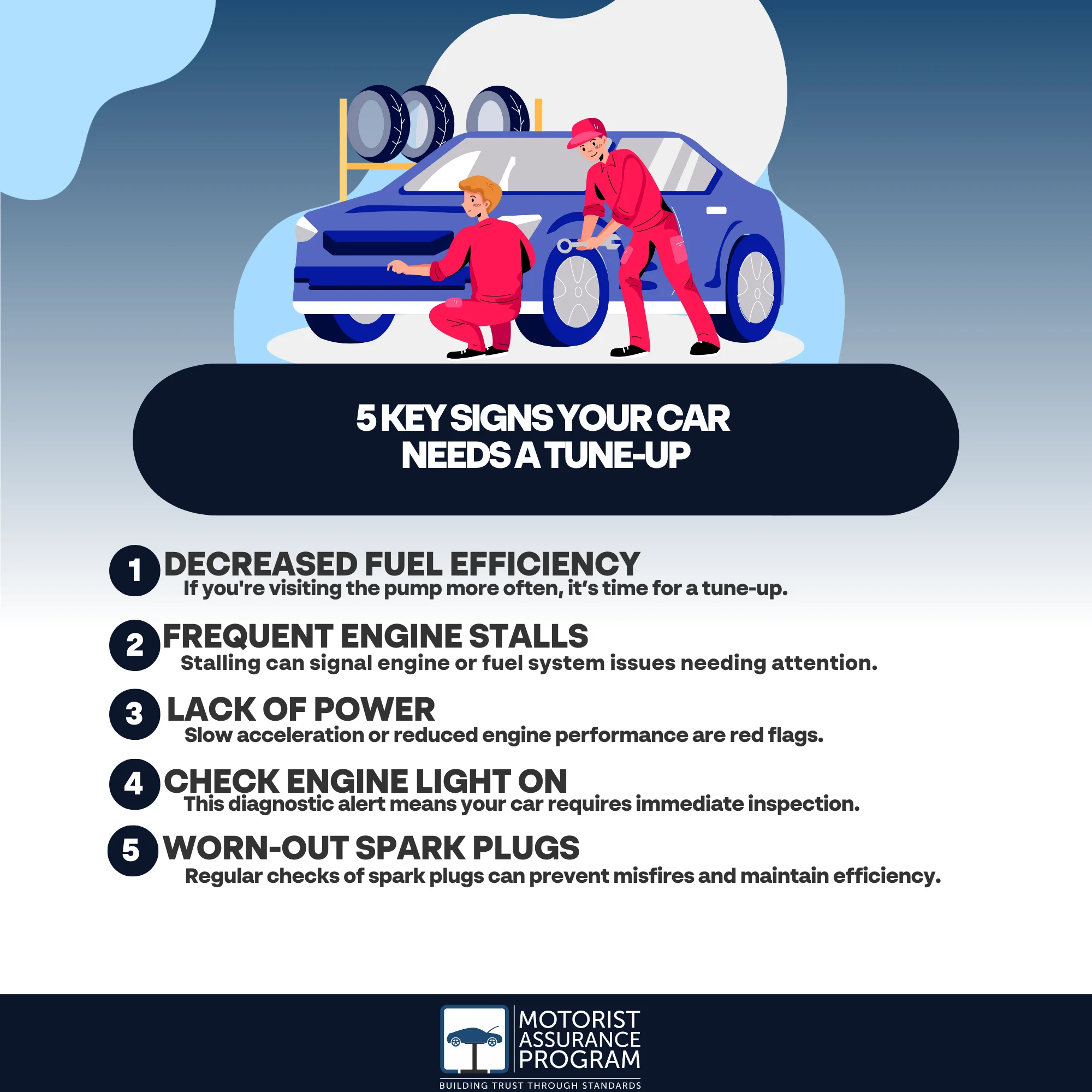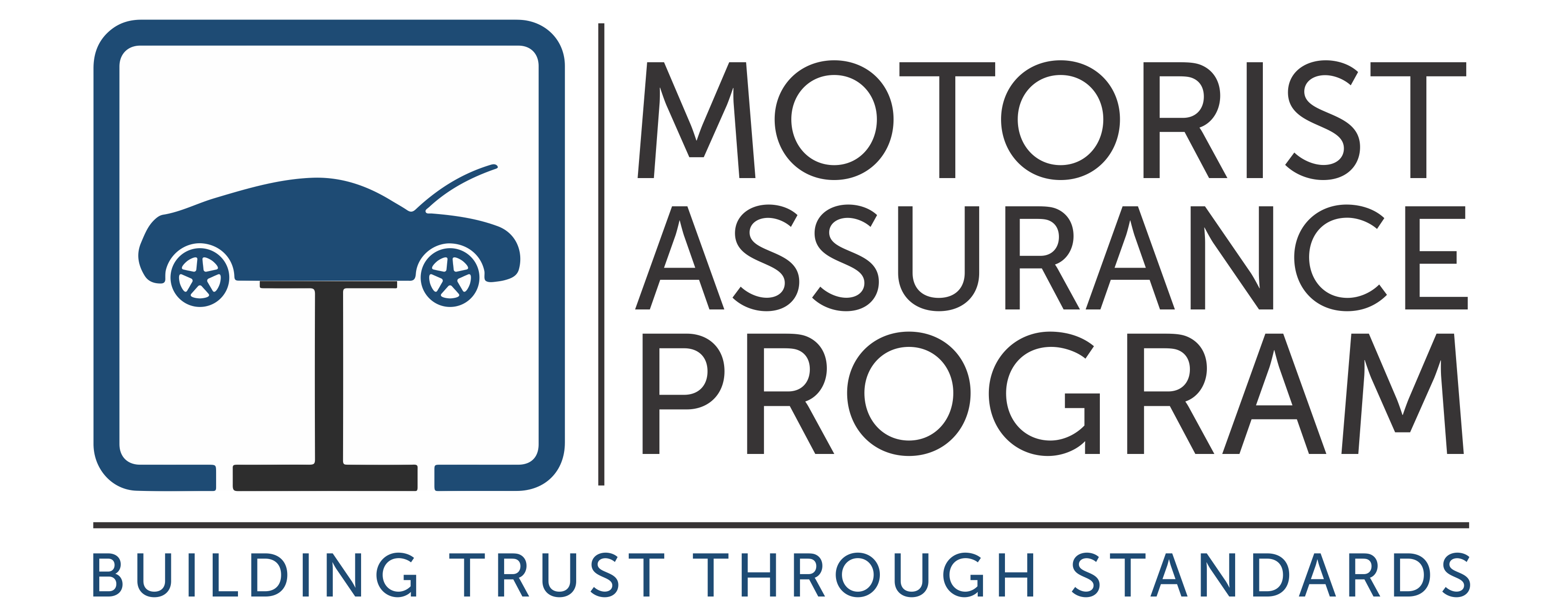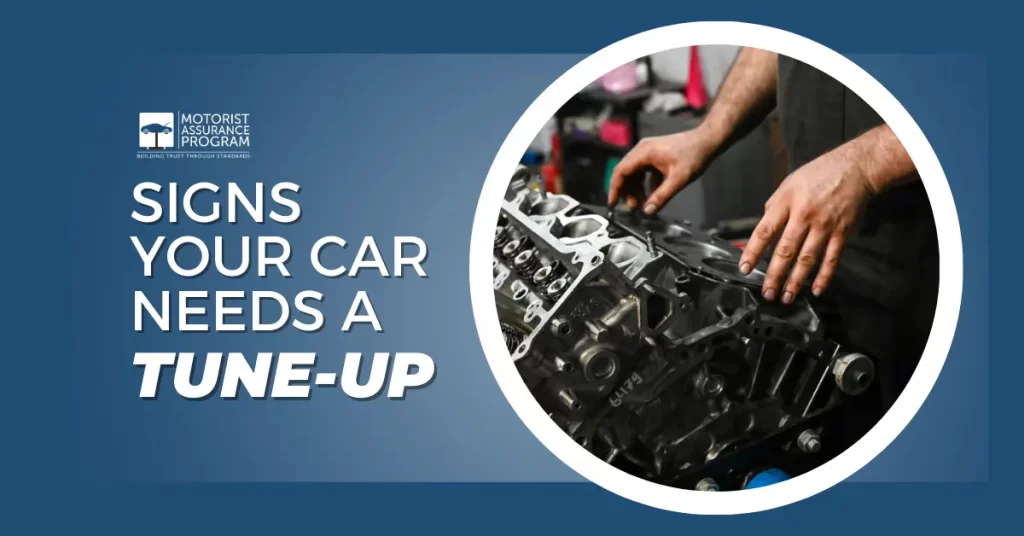Did you know that nearly 80% of car problems stem from poor maintenance? You’re probably aware that regular tune-ups can extend the life of your car, but spotting the signs for a needed tune-up can be tricky. If your car is stalling more often, your fuel efficiency has decreased, or your engine seems to lack power, it might be time for a check-up. Stay tuned as we explore each of these signs in more detail and discuss how ignoring them could lead to bigger, more expensive problems down the road.

Key Takeaways
- A noticeable decrease in fuel efficiency can indicate your car needs a tune-up.
- If your car’s engine stalls frequently, it’s a sign of potential issues requiring a tune-up.
- Experiencing a lack of power or acceleration from your car’s engine may suggest a tune-up is needed.
- If your check engine light activates, it’s a diagnostic alert that your car may need a tune-up.
- Regular visual inspections revealing issues with air filters or spark plugs can also signal your car needs a tune-up.
What Is an Auto Tune Up?
What exactly is an auto tune-up? It’s a routine maintenance procedure that’s essential to your car’s performance and longevity. Typically, an auto tune-up involves the inspection, cleaning, or replacement of certain car components to guarantee your vehicle is running at its optimum level.
However, contrary to what the term suggests, modern-day tune-ups no longer involve “tuning” the engine, as was the case with older cars. Nowadays, with the advent of computer-controlled engines, the concept of a tune-up has evolved.
You see, in the past, tune-ups were done to adjust the carburetor, timing, and other components, which are now managed by your car’s onboard computer system. When you’re getting a tune-up today, it’s really about preventative maintenance. It’s a thorough check-up for your car to prevent major issues down the line.
It’s important to remember that the frequency and specifics of a tune-up can vary depending on your vehicle’s make, model, age, and your driving habits.
To keep your vehicle at its best, it’s crucial to understand what an auto tune-up is and when your car might need one.
What Goes Into A Vehicle Tune-Up
Now that we’ve established the importance of tune-ups in maintaining your vehicle’s performance, let’s look at what exactly goes into this process.
A tune-up is more than just a quick check of your car; it’s a thorough examination and adjustment of several vital systems.
Here’s a rundown of what a typical tune-up might include:
- Engine Inspection: Your mechanic will check your engine for any signs of wear or potential issues. This involves looking at the spark plugs, ignition system, and fuel system to guarantee they’re running smoothly.
- Fluid Checks: They’ll check your car’s essential fluids, including oil, transmission fluid, brake fluid, antifreeze, and power steering fluid. These fluids are crucial to your car’s operation and must be at the right levels.
- Filter Changes: Your air and fuel filters will be checked and replaced if necessary. These filters protect your engine from harmful debris and maintain fuel efficiency.
- Belt and Hose Inspection: Finally, belts and hoses will be examined for cracks, leaks, or excessive wear that could lead to bigger issues down the line.
Warning Signs You Need a Tune-Up
Recognizing the signs that your car needs a tune-up can save you from expensive repairs down the line. You must be aware of the warning signals your vehicle is giving you. It’s not just about listening for strange sounds or feeling for unexpected vibrations. It’s also about observing and understanding subtle changes in performance.
Is your car stalling more often than usual? That could be a sign that it’s not running as efficiently as it should. Maybe you’ve noticed a decrease in fuel efficiency, or the engine just doesn’t seem as powerful. These are signs that your car could use a tune-up.
Your vehicle’s onboard diagnostic system (OBD II) is also a valuable tool. If your check engine light comes on, don’t ignore it. It’s your car’s way of saying something isn’t right.
However, don’t solely rely on the check engine light either. It may not catch minor issues that could lead to major problems down the road.
Regular visual inspections of your vehicle’s components, such as the air filter and spark plugs, can reveal problems before they become serious. Stay attentive, be proactive, and your car will thank you.
Avoid These Problems With Regular Tune-Ups
Ever wonder why routine car tune-ups matter? Well, they’re essential for maintaining your vehicle’s health and avoiding potential problems. Ignoring routine tune-ups could lead to dire consequences.
Let’s look at four main issues you can avoid with regular tune-ups:
- Decreased Fuel Efficiency: Over time, your car’s engine becomes less efficient due to wear and tear. Regular tune-ups guarantee your engine runs at its best, helping you save on gas.
- Unexpected Breakdowns: Tune-ups can catch small problems before they escalate into major ones. They reduce the risk of your car breaking down unexpectedly.
- Costly Repairs: Addressing minor issues during tune-ups saves you money in the long run. Neglecting these issues could lead to expensive repairs or replacements.
- Reduced Lifespan: A well-maintained car lasts longer. Regular tune-ups extend your vehicle’s life, protecting your investment.
Car Tune Up Checklist
Regularly maintaining your car involves a thorough checklist to guarantee it’s in top shape. Here’s a basic tune-up guide to help you keep your vehicle running smoothly.
Firstly, check your car’s oil and filter. If they’re dirty or low, it’s time for a change. In addition, inspect the air filter. A clogged one can reduce your car’s performance.
Then, examine the spark plugs. Worn-out ones can cause misfiring, affecting your car’s fuel efficiency.
Next, look at your car’s fluids. This includes brake fluid, transmission fluid, and coolant. If they’re low or dirty, they need replacement.
Also, check your car’s belts and hoses for any signs of wear or cracks.
Don’t forget your car’s battery. A weak battery can prevent your car from starting. Check the battery’s charge and clean any corrosion from the terminals.
Lastly, inspect the brakes and tires. Worn brake pads or uneven tire tread can be a safety risk.
Frequently Asked Questions
How Often Should a Car Typically Need a Tune-Up?
Typically, you should get a tune-up every 30,000 miles or two years. However, it’s important to refer to your car’s manual for specifics. Regular tune-ups can help maintain your car’s performance and longevity.
Can a Tune-Up Improve Fuel Efficiency in My Vehicle?
A tune-up can considerably boost your vehicle’s fuel efficiency. By optimizing your engine’s performance, you’re reducing fuel waste. It’s like getting more miles out of every drop of gas!
What Is the Estimated Cost for a Standard Car Tune-Up?
You’re asking about tune-up costs. They vary, but generally, you’re looking at $200-$800, depending on your vehicle and what’s included. It’s best to check with your local mechanic for an accurate estimate.
Are There Any Risks Involved in Postponing a Needed Tune-Up?
Yes, there’re risks in postponing a needed tune-up. You might encounter decreased performance, poor fuel efficiency, or even severe engine damage. It’s crucial to maintain your car regularly to prevent costly repairs in the future.
How Long Does It Take to Complete a Full Car Tune-Up?
A full car tune-up typically takes four to five hours. However, it’s not a one-size-fits-all situation. The duration depends on your car’s condition and the mechanic’s expertise. Don’t risk postponing; guarantee your car’s health now.
Conclusion
Don’t ignore the signs your car’s screaming at you. A whopping 60% of engine failures are due to lack of maintenance, including regular tune-ups. Remember, a timely check can save you from expensive repairs down the line. Keep your car running smoothly and efficiently by addressing those warning signs and sticking to your tune-up checklist. After all, it’s better to stay ahead of the game than to play catch-up.


